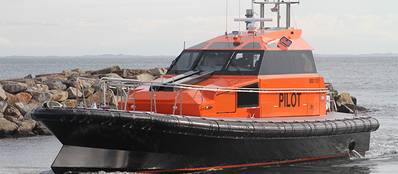Wave Piercing Pilot Boats Built with DIAB Material Delivered
Imagine having to bring a 100,000 tons ship into port in rough weather and heavy seas, navigating through a narrow, rocky passage bordered by dangerous reefs. Port Phillip Bay, which forms the entrance to the Port of Melbourne, is a place that one can love one day and really hate the next. Its treacherous waters are amongst the most dangerous in the world, and more than 700 vessels have met their end at the entry and within the bay.
Since 1839, it has been the responsibility of the Port Phillip Sea Pilots to steer ships safely through the labyrinth of rips, reefs and unpredictable tidal currents as they enter and leave the bay. They operate 24 hours a day, 365 days a year. And their state-of-the-art boats are amazingly tough composite constructions, built by Hart Marine around DIAB structural cores.
Pilot boats need to be tough
A pilot boat is built for maximum performance and designed to guarantee safe operation. It must be a stable platform during pilot boarding, minimizing vertical movement at high speeds in rough weather conditions and providing high maneuvering capabilities and efficient running at transfer speeds. Also, all the structural elements must be able to manage a great deal of impacts. Thinking steel? Think again.
The best pilot vessels are built of composite material. That is why the Port Phillip Sea Pilots, when looking to acquire two new boats, selected French Pantocarene self-righting design and Hart Marine in Mornington, Victoria, to build them.
Composites rule the waves
Composites have been in the maritime industry since the 1960s and with good reason. They allow a huge freedom in the design process, they don’t corrode and it is possible to create very robust structures with them. The Hart Marine composite construction uses vacuum bag resin infused technology which provides thermal and acoustic advantages (better insulation in the cabin), lower maintenance costs over the life cycle of the vessel compared with other materials, and a high standard of finish.
Partnering with DIAB for excellence
The core material used throughout Hart Marine’s projects is provided by DIAB who also provides services through its technical service department and the Composites Consulting Group (CCG) engineering division. This partnership has enabled Hart Marine to further develop their offerings and improve their efficiencies during the build process. Improved kitting solutions and finishes have allowed for the build time to be continuously reduced while keeping the strength requirements for vessels such as the new pilot boats.
Port Phillip Sea Pilot’s maintenance chief Chris Richards, who has had 35 years with the sea pilot organization, describes the design and construction of the new boats as exceptional. The French naval architects Pantocarene have also endorsed Hart Marine’s build quality.













